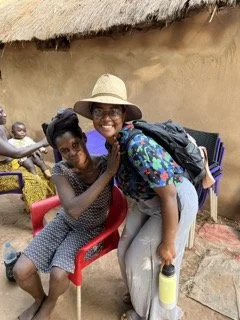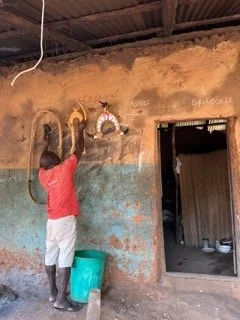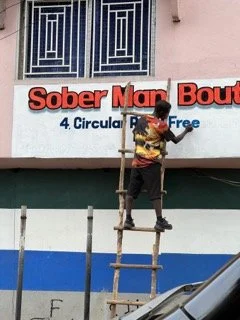“What was it like being in the Motherland?”
The things written in this blog are totally my (constantly evolving) opinion. Some of it is controversial and I am not speaking for every Black person. I only speak for myself and if you ask me what I think about this in 5 years, my opinion might change.
Being Black in West Africa
“What was it like being in the Motherland?” was the number one question I got after my trip throughout West Africa. At first, that question made me feel uncomfortable because it made me feel like there was an expectation about what kind of experience I was supposed to have. I’m sure the response that they were expecting me to say was something to the effect of, “It was amazing; I finally felt at home!” Half of that is correct- it was AMAZING. But maybe not for the reasons they were expecting. The truth is, I did not feel “at home” and like I met some kind of instant peace and familiarity when I went to Africa. (I did end up finding peace, but I had to work hard for it). It felt mostly like it feels when I visit any other place: I’m learning about and exploring culture and food and art and nature and it all feels new and exhilarating.
As is the point of this blog, I have some thoughts on many aspects of that first paragraph. First, I think “What was it like being in the motherland?” was the number one question because of the fact that Black people are slapped in the face with being un-at home in America. For that reason, it is such a fair question, even though I hated receiving it. Moreso, I think we are longing to find home or peace in some place, or at least knowing that that place is out there.
The reality though, I think, is that we have to find that within ourselves because it’s much more complicated than just stepping foot in a place and all being well. This may be why some people I met said, “Well, we accept you as part of our culture/tribe.” and it didn’t feel sufficient. So no, I did not feel at home. Some of the reasons why are that Africa is a huge continent with over 2,000 ethnicities. Yes, most slaves came from West Africa, but even within that area, there are so many ethnicities and subcultures. Slaves from different countries were intentionally mixed up (it’s much easier to organize and fight when you share language, culture, and even blood). When I did 23 and Me, it showed that my DNA is made up of over 8 West African countries alone. Within those countries is an incredible amount of diversity and to assume that they are all one culture is dismissive of their individuality. I still struggle with the idea of Black people wearing or using traditionally, broadly, “African items'' and its relation to cultural appropriation. The reason I go back to “No, it’s not appropriation.” is that I have extreme empathy for someone trying to connect to community, heritage, and identity. I also have recognition that we don’t know and don’t have a specific culture to identify with within West Africa (on purpose) and we deserve to reclaim something, damnit.
These ideas around a connection to a specific culture in West Africa, or any country in Africa, is exactly why I feel there is a difference (although not mutually exclusive) between the terms “African-American” and “Black”. My thinking is that “African-American” describes African immigrants to America. “Black” describes just being of Black skin and a descendant of Africans while in America (Black people don’t exist in Africa is something that I heard a lot on my trip and agree with. They are just people- they are all Black so there is no need to delineate them by race). Not all Black people are African-American, but all African-Americans are also Black. African-Americans receive a lot of the same marginalization that Black Americans do, but also have the experiences of emmigation/immigration.
Black Identity
My least favorite thing about being Black is that I don’t have a connection to a specific culture or a “motherland”. It leaves me and many other Black people at a disadvantage to beginning our journey of learning who we are. Not knowing where you are rooted or connected to and, more importantly, not having one, is traumatic, at least for me it is. I hate it. The truth is, it was hard going to Africa and not feeling some extra connection that I’m supposed to feel. I felt a pressure from others and myself to come back with some epiphany and genius realization about my identity. Once I let go of that and accepted that I am not automatically “at home” just because I am Black and because a good chunk of my ancestors come from multiple, unknown, areas in the vicinity. There were points while in West Africa that I was called White or Latinx for goodness sake!
I’d be lying if I said I didn’t go to West Africa hoping to be automatically embraced and to have a magical encounter that gave me confirmation that I did have a motherland. While there though, I came to grips with the fact that I might not feel a special connection to a place on earth that could explain a large part of my identity- White people stole that from me. I did discover that I could and would create that for myself. My identity is being Black in America, being a descendant of strong, intelligent, courageous slaves, and having a conglomeration of intentionally mixed up West African blood in an attempt to destroy my people. I am Black no matter where I am in the world and I create my own identity, whether I could pinpoint a specific place or not.
Growing Up Black
It is an understatement to say that I struggled with my identity being Black while growing up. I learned at a young age that Blackness was not valued and I hated myself, my skin, my hair, and my ancestors for being born Black. I am New Orleans Creole and I clung onto that as a child- “I’m also white, so I’m not all bad.” Writing this makes me sad to think of little Meghan’s feelings about that. I did not want to be associated with anything “Black” growing up. I did not have Black friends, I listened to rock music because I thought Black people didn’t, you get the picture. As I grew up, I started to learn that doing that was sad, but still didn’t feel comfortable with my Blackness and I didn’t feel like I fit in with Black people. It wasn’t until the summer of the death of George Floyd that I began to feel proud of being Black (Thank you, George Floyd). Or maybe I just jumped on the bandwagon during that moment in culture when being Black was cool to the rest of the world. I’m not perfect (I’m going to be honest and authentic on this blog, even if it embarrasses me). But I’m glad it changed me. Again, I still didn’t know how to be Black. It wasn’t until I met one of my best friends who taught me that there is not one way to be Black (Check out my interview with her in the videos!). I am just by virtue of my physical appearance and my ancestors because those physical features automatically bring marginalization and power and hardship and joy. How I look determines my social experiences.
I knew for a while that Black people are not a monolith and being one way doesn’t mean I’m less Black. It’s still true though that being Black in America is dangerous. When I pull up beside a white person in my car, I turn my loud music down (because one thing imma do is blast my music). I turn my Ebonics on and off depending on the situation. This is all the basics of code switching but it’s worth mentioning again and again how exhausting it is.
If you ask me today, I am proud to be Black (I am learning to stop turning my music down around white people). Sometimes it’s scary and straight out unsafe to be unapologetic. But I work on it every day, and it’s fun. I wouldn’t choose to be anything but Black! My trip to West Africa was amazing and extremely challenging and confusing and fantastically life changing for reasons outside of exploring my identity as well. This blog seems confusing and all over the place to me as I write it, but that is the nature of this subject so I’m just gonna embrace how untethered and unorganized this piece of writing feels. And give me a break- I’m trying to summarize my thoughts on Black identity in 2 pages!



